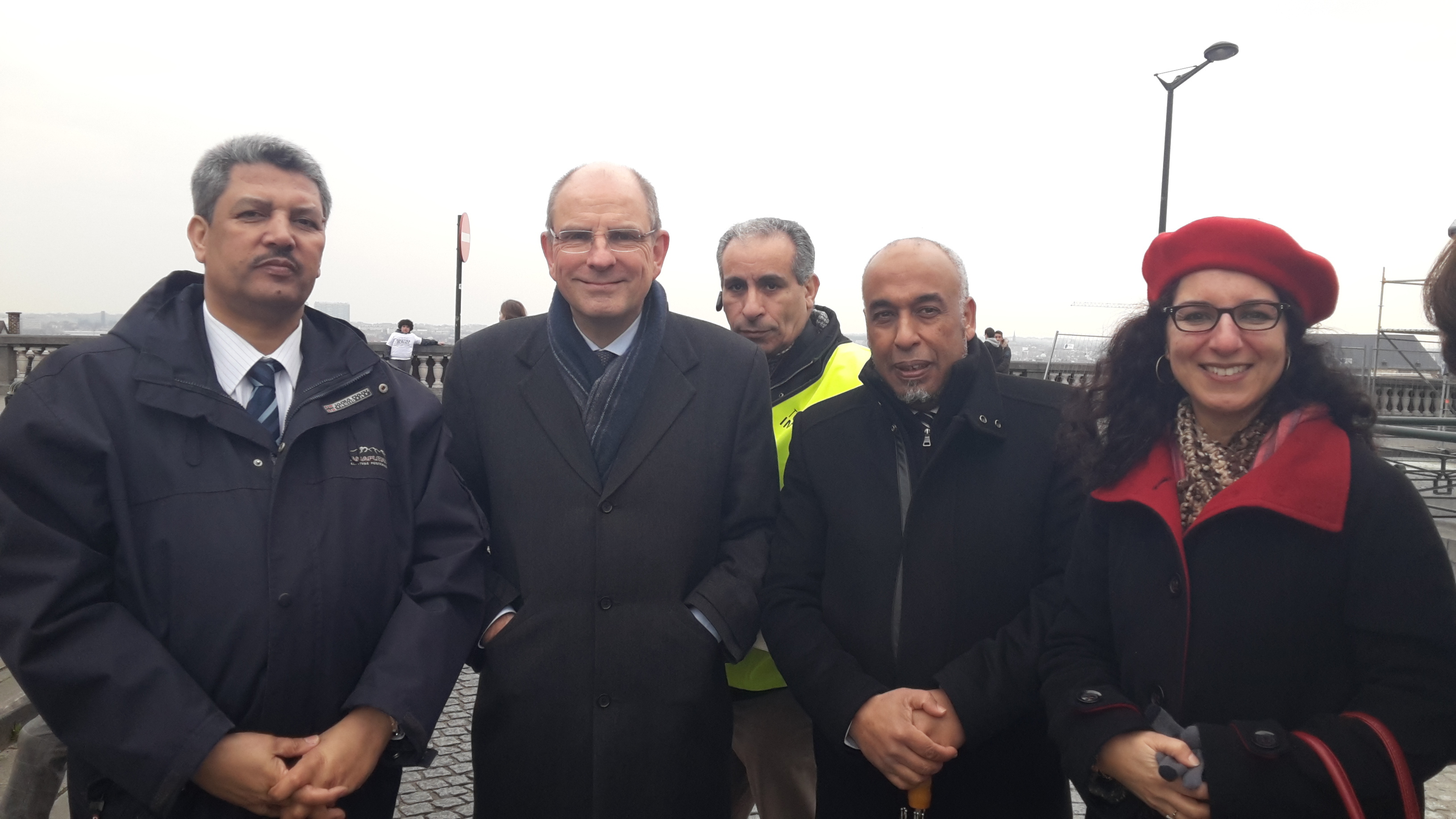Justitieminister Koen Geens (CD&V) spreekt de menigte bij aankomst op het Poelaertplein nog toe:
L'ignorance est le père de la violence, la peur est la mère de l'intolérance. Paradoxalement, dans un monde global ou tout le monde est censé connaître l'autre, l'ignorance et la peur ont plus de chances pour se développer. En effet, l'ignorance et la peur sont davantage nourris par l'information dans la mesure où celle-ci ne se transforme pas en connaissance.
Wij leven in een wereld van geïnformeerde niet-weters, terwijl onze voorouders doorgaans niet-geïnformeerde weters waren.
Dans notre monde il y a plus que jamais des informés qui ne connaissent pas, de sorte à ce que les informations dispersées se confondent dans leur esprit et se confondent de par ce fait même en violence et intolérance.
Ce qui manque à l'informant qui est à l'origine de la communication pour rendre l'information moins confrontante, et plus communicative, c'est le temps qu'il faut pour l'interprèter et pour communiquer non seulement cette information en tant que telle mais aussi son interprétation qui est nécessaire pour la rendre compréhensible.
Ce qui manque à l'informé qui est le destinataire de la communication en vue de rendre l'information moins effrayante et plus comfortante, c'est fréquemment la connaissance ou la volonté pour comparer cette information avec son propre histoire en vue d'en retenir surtout la ressemblance qui facilite la compréhension de la situation.
En effet, la compréhension est universelle, parce que l'essence de l'être humain est identique partout dans notre monde.
Dat inzicht dat het menselijk wezen hetzelfde is overal in de wereld, kan enkel ontstaan indien mensen zeker zijn van zichzelf. Dat vergt opvoeding tot identiteit, in de eigen omgeving, en wordt bevorderd door de beleving van een eigen religie of levensbeschouwelijke overtuiging.
Iemand opvoeden zonder hem een religieuze of levensbeschouwelijke overtuiging voor te houden, is een overschatting van de menselijke persoon. Een kind wil weten waarom, ook als op die vraag geen universeel antwoord bestaat. Een mens kan slechts tot het andere en tot de ander komen door de tradities van zijn ouders en van zijn land goed te kennen, desgevallend ze te koesteren, of zo men tot dat inzicht komt, die tradities delicaat bij te sturen of ze zelfs te verwerpen.
Wie zichzelf goed kent, is niet geneigd tot geweld. Wie zichzelf goed kent, heeft geen angst voor de ander, ook niet als die tot geweld zou kunnen neigen. Er is slechts één universele redding in onze wereld: de opvoeding van jonge mensen tot zelfbewuste en democratische personen, die de kans krijgen om in vrijheid een overtuiging te ontwikkelen nadat hen duidelijk maar zonder dwang een levensbeschouwelijke overtuiging is voorgehouden, met de vermelding dat niet iedereen die overtuiging is toegedaan, en dat ook andere overtuigingen waardevol zijn.
The education of young people is the co-responsibility of their parents, their school, the civil autorities. Parents may choose to be part of a religious cor philisophical ommunity. In that case, children will generally grow up with the stories their parents were led to believe, and they will accept or question those stories, or understand them differently.
There is no better way to acquire a positive feeling about one's own identity than such religious or philosophical education when it is inspired by the authentic intention to create a better world.
There is no better weapon to destruct identity than the deformation of a religious or philosophical message, so that it results in hatred, war or terrorism.

Leaderschip is about the transformation of information into knowledge and about explaining this process to the people one feels responsible for. Of course, there should be unlimited access to information for everyone, but leaders have to make this information understandable by pointing at ressemblances and at differences as a reason to rejoice, rather than to convert, as a reason to integrate rather than to assimilate.
Leaders should know their history. Europe which only 70 years ago went through world war II should be modest in judging others, but try to better understand what caused Middle East violence and even what may have been its own responsibility in causing such violence.
All of us today, whether civil or religious leaders, should behave as leaders who owe it to themselves and to our neighbours to underline that solidarity in true respect for the identity of our fellow citizens is the only way forward, is indeed the only way to make our planet sustainable and for leaving it behind us in a better state than the state wherein we found it. Our convictions, religious or ideological, should serve that goal and be told and retold in that perspective and in that perspective only.
Pessismism never won a battle. L'homme a été capable dans sa longue histoire de s'adapter génétiquement aux circonstances difficiles qui étaient les siennes. Il s'est réalise aux début des temps que vivre en groupe était essentiel à sa survie, et que la survie du groupe, le cas échéant par la destruction d'un autre groupe, était donc vitale.
De la meme façon, l'homme sera capable de se réaliser que les grands changements technologiques, écologiques et économiques du 20 et 21 siècles le rendent nécessaire pour sa propre survie et celle de son groupe de contribuer à la survie des autres groupes plutôt que de les détruire parce que ça mènera a l'autodestruction.
Ik eindig ter uwer inspiratie met de Franse filosoof Luc Ferry die nog Minister van Nationale Opvoeding is geweest. Aan elkeen onder ons die verantwoordelijkheid draagt, houdt hij de volgende handelingsimperatief voor: "als gij een moeilijke beslissing moet nemen, en ge wilt die toetsen aan een adequaat criterium, vraag u dan af of ge dezelfde beslissing zou nemen indien diegene op wie ze betrekking heeft iemand zou zijn die ge heel graag ziet; lijkt het u dan nog een goede beslissing, dan kunt ge ze met gerust hart nemen".